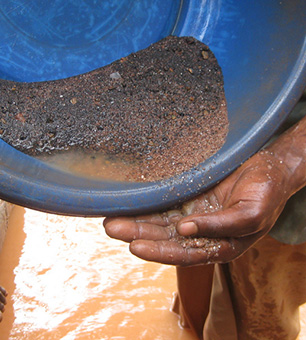Public Citizen and Amnesty International are urging the court to uphold the validity of a Dodd-Frank rule aiming to curb funding for armed groups contributing to the ongoing humanitarian crisis in the Democratic Republic of the Congo.
The U.S. Court of Appeals for the D.C. Circuit heard oral arguments this week concerning a rule requiring certain companies that file reports with the Securities and Exchange Commission (SEC) to investigate and publicly disclose whether their products contain minerals from the Democratic Republic of the Congo (DRC).
A variety of electronic products rely on the minerals, including smartphones and laptops, and are a primary source of funding for warlords and other armed groups who perpetuate the ongoing conflict and genocide in the Congo.
The National Association of Manufacturers, the U.S. Chamber of Commerce, and the Business Roundtable are challenging the rule in court, while Public Citizen is representing Amnesty in urging the court to uphold the rule.
All three of the industry groups attempted to water down the rule as it went through the rule-making process, after Congress passed Section 1502 of the Dodd-Frank Wall Street Reform and Consumer Protection Act in 2010, which aims to reduce the trade of these conflict minerals. Section 1502 directs the SEC to adopt the conflict mineral rule as part of the law’s implementation.
The industry groups are arguing that the rule violates corporations’ First Amendment rights, but transparency advocates are arguing that the rule will help investors and consumers make more informed decisions by forcing companies to report the facts concerning the presence of conflict minerals in their products.
Amnesty and the SEC are also arguing that the SEC already considered arguments of the manufacturing industry when adopting the rule, deciding to leave it mostly intact and foregoing the exceptions now sought by the business groups in court. Exceptions the rule’s critics are proposing could potentially render the rule useless.
The industry groups first petitioned the U.S. Court of Appeals for the D.C. Circuit for review of the conflict minerals rule and Section 1502 in October 2012. Amnesty acted as respondents advocating for the rule. But the case was transferred to the D.C. District Court because the D.C. Circuit lacked jurisdiction.
In July 2013, the district court upheld the rule in full and rejected the argument that Section 1502 violates companies’ First Amendment rights.
“The industry groups’ court challenge is a blatant attempt to overturn the will of Congress,” said Julie Murray, a staff attorney with Public Citizen, which is litigating the case. “There is no First Amendment right here to keep the public in the dark about whether their sourcing practices are helping to fund armed groups in the Congo.”
Murray told Truthout that more than 13,000 letters from the public were sent in to the SEC urging the agency to uphold the rule. But it could still be weeks or months before the Court of Appeals issues its decision.
If the rule is upheld, multinational electronics corporations, among others, will be required to file the disclosure of this information every year, regardless of when their fiscal year ends. Companies would file their first disclosure report on May 31, 2014 for the previous year and annually on May 31 thereafter.
For nearly two decades, the DRC has been under siege amid armed conflict that has caused the genocide of millions. Most recently, at least 26 people were killed this week in an eight-hour battle between government and rebel forces in the Congo’s city of Lubumbashi, according to authorities.
“This legal challenge to the Conflict Minerals Rule is nothing but a crass effort by industry groups to put profits ahead of principles,” said Steven W. Hawkins, executive director of Amnesty International USA, in a press release. “The rule was required by Congress to save lives and stop human rights abuses by curbing the flow of funding to armed groups operating with impunity in the areas these minerals are mined — in Democratic Republic of the Congo and other central African countries.”
Join us in defending the truth before it’s too late
The future of independent journalism is uncertain, and the consequences of losing it are too grave to ignore. To ensure Truthout remains safe, strong, and free, we need to raise $46,000 in the next 7 days. Every dollar raised goes directly toward the costs of producing news you can trust.
Please give what you can — because by supporting us with a tax-deductible donation, you’re not just preserving a source of news, you’re helping to safeguard what’s left of our democracy.
